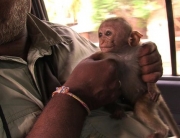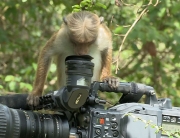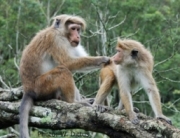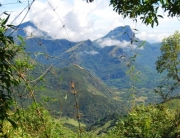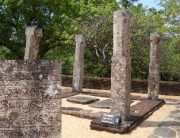The Sunday Times newspaper (Vol 50, No. 13), Sunday, August 30, 2015
Sri Lankans star in Hollywood epic
By Malaka Rodrigo
Where humans failed, our rilawas succeeded
Although human Sri Lankans have failed to take leading roles in Hollywood a film composed entirely of Sri Lankans has now entered the history books and the actors are our closest cousins, our own rilawas, the endemic toque macaques (Macaca sinica).
The epic story of a monkey troop living in Polonnaruwa, captured in the Disney film Monkey Kingdom, was released in Sri Lanka on August 21.
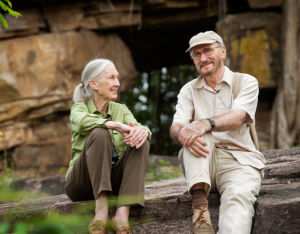
Dr. Wolfgang Dittus with Dr. Jane Goodall
Monkey Kingdom’s main characters are lead female Maya, a low-caste being, her newborn son Kip, the troop’s alpha male Raja, a trio of high-status females called The Sisterhood, and Kumar, a newcomer wishing entrance to the tribe. The struggle of mother Maya brings tears to viewers’ eyes.
The monkeys’ struggle for power is also well documented in the movie, adding some adventure, and viewers may spot some recent political parallels. The monkey clan inhabit Castle Rock. Raja controls the group with an iron fist. A new team using strategic tactics lure the rock’s inhabitants into the jungle and defeat Raja’s party. Raja himself loses the troops’ leadership to Kumar, who plays monkey politics wisely, building relationships with many monkeys. This will surely make flashes of comparison of recent political events in Sri Lanka although the film’s production began three years ago.
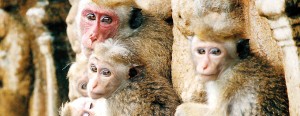
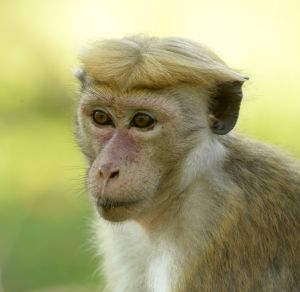
Maya, star of “Monkey Kingdom”
Monkey Kingdom is the sixth theatrical release for Disneynature and cost $16.4 million. Disney brought world-acclaimed nature filmmaker Mark Linfield to Sri Lanka to direct it. The film crew spent 1,000 days on location, the most time spent in the field for any Disneynature feature film, according to Linfield.
It was, however, resident primatologist Dr. Wolfgang Dittus’ research that made this movie possible. German-born Dr. Dittus has been studying macaques in Sri Lanka for nearly 50 years, the longest-running monkey study of all time.His research proved invaluable to the film crew. His knowledge of the monkeys in Polonnaruwa allowed the filmmakers to understand their social structure, day-to-day lives and individual personality traits. As a result, they could choose their “stars” wisely and approach filming in an informed way, telling the troops’ true story as it unfolded.
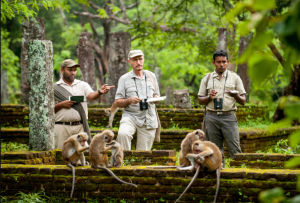
Dr. Wolfgang Dittus with primate naturalists Chameera Pathirathne & Sunil Rathnayaka
Furthermore, the fact that Dr. Dittus and his researchers have been studying the Polonnaruwa monkeys for almost five decades gave filmmakers access to the animals that would not have been possible with monkeys who were not familiar with humans. “Our many decades of past research invested in these toque macaques paid dividends for the production,” Dr. Dittus said. “Not only do we know these monkeys intimately but the monkeys were perfectly at ease and behaved normally when the film crew pointed a camera at them. They treat us as a normal part of their environment, like a deer or a tree.”
Dr. Jane Goodall, the world’s authority on chimpanzees, who also visited the Polonnaruwa site, says the mother-child relationship in primates always inspired her. “When Maya first has her little boy Kip, we see how difficult it is for her to care for him when, at any moment, the dominant females can just take him away and there’s nothing she can do about it,” she said.


Cameramen Martyn Colbeck & Gavin Thurston with primate biologists Chameera, Rathnayaka & Sunil Gunathilake
The movie features breathtaking scenery captured with high-quality equipment. Taya Diaz, a nature documentary maker who helped make the BBC’s film, Temple Troop, also based on the Polonnaruwa monkeys points out that Sri Lanka an abundance of wildlife that can make to the big screen and our film-makers need to look for them.
“It is important to see nature through a scientific eye and make these kind of movies that can help to bring out the value of Sri Lanka’s nature,” Diaz said.
Monkey Kingdom has already been nominated for some awards.
| Monkeys boost Lanka as a nature destination Sri Lanka Tourism Promotions Bureau Chairman, Rohantha Athukorala hopes the worldwide release of Monkey Kingdom will be a massive boost to Sri Lanka’s visibility due to “screen-based” marketing, where tourism in a country featured in a popular movie increases due to movie enthusiasts visiting the original location.The tourism bureau used the launch of the film in the United States in April to promote Sri Lanka there, and did the same in China.Mr. Athukorala said the bureau was pursuing the possibility of setting up a “Monkey Kingdom” in the Disneyland Park in Shanghai.The next major release is in France, in November, and the bureau will launch a drive there promoting Sri Lanka as a nature destination.These events clearly indicate the importance of wildlife to Sri Lanka. Often seen as pests, the monkeys are helping to promote Sri Lanka. Environmentalists point out this alone should be a reason for protecting the remaining wildlife habitats of Sri Lanka, which could attract more tourists, bringing in much-needed foreign exchange.Monkeys invade houses, becoming a nuisance because of the fault of the humans themselves. Dr. Dittus warns people not to offer food to monkeys and not to even throw food out if monkeys are hanging around as food and water will attract them to homes, leading people to regard them as a threat or nuisance. |

